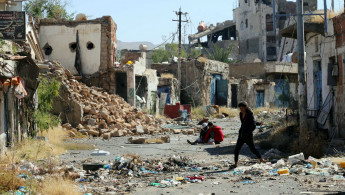BAE profits up 13% while Middle East burns
Earnings last year shot up 13 percent year-on-year, BAE's annual financial report boasted on Thursday.
Activists reacted angrily to BAE's financial report, claiming that the increase in sales was a cause for shame, not celebration.
"BAE systems has continuously profited from arming and supporting some of the most brutal regimes around the world," said Andrew Smith, a spokesperson for the Campaign Against the Arms Trade.
"This is not something for British businesses to be proud of - this is UK complicity in human rights abuses and conflicts around the world."
BAE's chairman previously absolved BAE of any involvement in the ultimate destination of his company's product.
"We are not here to judge the way that other governments work, we are here to do a job under the rules and regulations we are given," said Roger Carr.
BAE Systems attributes this sales rise almost entirely to currency "exchange translation".
"We book some of our sales in other currencies… and then translate that into pounds when we report our results," said Lindsay Wall.
 |
BAE's major customers, which include the United States, and Saudi Arabia and other Middle Eastern nations, are known to have massively ramped up arms receipts in 2016 |  |
Yet BAE's major customers, which include the United States, and Saudi Arabia and other Middle Eastern nations, are known to have massively ramped up arms receipts in 2016.
BAE signed a $5 billion contract with Saudi Arabia in November, including fighter jets like the ones the kingdom uses in its Yemeni campaign.
A recent High Court case in London heard that the UK government had come within hours of cancelling some of these contracts, due to the explicit risk that they could be used in war crimes.
A UN panel of experts found in 2016 there was "no evidence that [coalition] airstrikes had targeted legitimate military objectives" in eight out of ten of their investigations.
In March 2015, a Saudi-led coalition launched a military campaign to help the internationally recognised government regain control of territory lost to the Houthi rebels.
Figures suggest more than 10,000 people, half of which civilians, have died since this intervention, while 3 million more were forced into displacement.





 Follow the Middle East's top stories in English at The New Arab on Google News
Follow the Middle East's top stories in English at The New Arab on Google News
![Israeli forces ordered bombed Gaza's Jabalia, ordering residents to leave [Getty]](/sites/default/files/styles/image_330x185/public/2176418030.jpeg?h=a5f2f23a&itok=_YGZaP1z)

